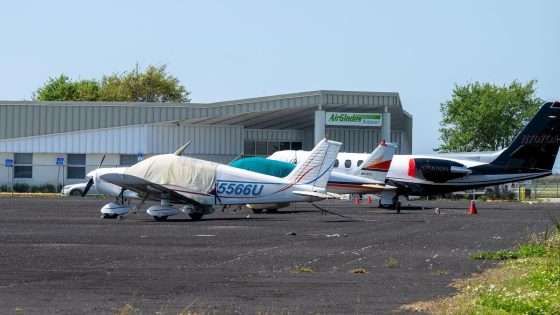LaBELLE, Fla. — One of Florida’s poorest counties is preparing for the new “Airglades” airport, a $300 million cargo hub that could transform its economy.
Local leaders see the project as a generational opportunity, one that could bring more than 1,400 new, high-skilled jobs to their largely agricultural community at the edge of the Everglades. But to make good on its promise, the region’s educators will have to overcome some harsh realities.
A third of Hendry County’s working-age adults lack a high-school diploma, while almost half speak a language other than English at home, among the highest in Florida. Before local leaders can prepare residents for jobs in engineering and manufacturing, educators must first help them earn their GEDs and learn English.
“We have some of God’s most beautiful country that has never been touched by man,” said Michael Swindle, the county schools superintendent, and yet “by all the metrics you would judge a county on, we’re either No. 1 or No. 2 in the ugly categories.”
As the airport project pursues approval, community groups and schools are working to fill teacher shortages and make investments in adult education.
The challenges also include some political headwinds. Most of the county’s workforce is Black and Latino. Efforts to tailor education to serve those demographic groups have drawn scrutiny in Florida, where politicians have forbidden programs factoring race and national origin into people’s treatment. Educators say the political context adds to the difficulties in recruiting teachers.
The plan to convert the small, county-owned airport to private ownership still has to win approval from the Federal Aviation Administration, which will depend partly on solidifying contracts with vendors in Latin America to prove its potential as a hub for perishable goods.
Meanwhile, two adult education centers in the county expanded with support from the FutureMakers Coalition, a community organization that has spearheaded education retraining efforts across southwest Florida. It also is paying for a counselor to help adults looking to develop new skills and change careers.
Spanish-speaking students have filled the adult education center in LaBelle, the 5,000-person county seat.
Many are working jobs or have kids at home, which has forced their instructor, Silvia Gullett, to get creative to meet their needs. She started a WhatsApp group so students could organize carpooling or split childcare duties. If students don’t show up to class, Gullett texts them to figure out the problem. She doesn’t settle for easy excuses.
“In the beginning, I had some students who didn’t want to continue. I try to tell people that the only one who can stop them is themselves,” said Gullett, who was born in Peru before starting her teaching career in Florida two decades ago.
At the country’s other adult education center, in Clewiston, sparks fly as dozens of students in thick gloves and respirator masks work toward industrial certifications needed to enter the workforce. One of them, Samantha Garza, 21, initially studied child care at a community college in Fort Myers but pivoted after watching YouTube videos about female welders.
“I’m an artsy person, so I have more of a steady hand already, and I love to be down and dirty doing physical things, so I felt like this would be a career for me,” she said.
Even before the airport arrives, there are still plenty of local employers waiting to hire the students. As current employees near retirement age, U.S. Sugar, the Clewiston-based farming giant, has such urgent needs it started an in-house welding program.
“We’re trying to close that generation gap between mechanics and welders,” said Nathan Hollis, an industrial skills trainer at the company.
Finding enough instructors to offer the training has been a challenge. Swindle had to recruit a U.S. Sugar worker to teach welding and coax a school bus mechanic out of retirement to lead the diesel mechanics program.
Still, the program has been so successful the county is using tuition revenue and donations to open another training facility in LaBelle focused on HVAC and plumbing.
There has been controversy around some efforts, including a slide on the topic of “white privilege” shown during a teacher training event led by FutureMakers. It sparked an outcry from conservative activists who accused organizers of racism, and a Republican city commissioner in LaBelle suggested it violated the “ Stop WOKE Act ” signed into law by Gov. Ron DeSantis, a Republican.
The political climate in Florida has made it difficult to attract K-12 teachers, according to Swindle. In a state where DeSantis has harnessed culture war passions in his education policies, Swindle said many of his teachers feel unsupported.
“The rhetoric around public education is horrible. It absolutely does hurt us,” Swindle said.
Teacher shortages threaten local schools’ ability to teach not just welders and mechanics, but also construction workers, nurses and other professionals to support the influx of people the airport could bring.
“We don’t have a chemistry or physics teacher in high school. We’ve left the job openings up for three years, and we can’t even get someone to apply,” Swindle said.
The county has been running more marketing campaigns to recruit educators and paying paraprofessionals to secure licenses so they can become teachers with help from a $23 million Good Jobs Challenge grant from the U.S. Department of Commerce.
There is a lot at stake for Swindle’s long-time home.
The superintendent knows where the alligators lie, sunbathing along the acres of canals that irrigate fields of sugarcane. He knows which sabal palms make the best swamp cabbage, teaching his sons how to cut palm hearts out with his knife, like their ancestors did to survive leaner times.
Yet there is no way to know if all his retraining efforts will be successful. The airport still might not come, especially if the county can’t prove it will have the workers ready to support it.
For now, officials are trying to fill current workforce needs while test-driving their ability to spin up new training programs. Once construction begins on the airport, they know they will have about two years to teach a wave of logistics operators, agricultural customs inspectors and other aviation-specific professionals.
“We’re not just talking about an airport,” Swindle said. “We’re looking at this as an opportunity to move the needle on unemployment, on poverty, to a better place.”
___
Nick Fouriezos covers the role of college in rural America for Open Campus, a nonprofit newsroom focused on higher education. Sign up for his newsletter, Mile Markers.
___
The Associated Press’ education coverage receives financial support from multiple private foundations. AP is solely responsible for all content. Find AP’s standards for working with philanthropies, a list of supporters and funded coverage areas at AP.org.
Source Agencies



